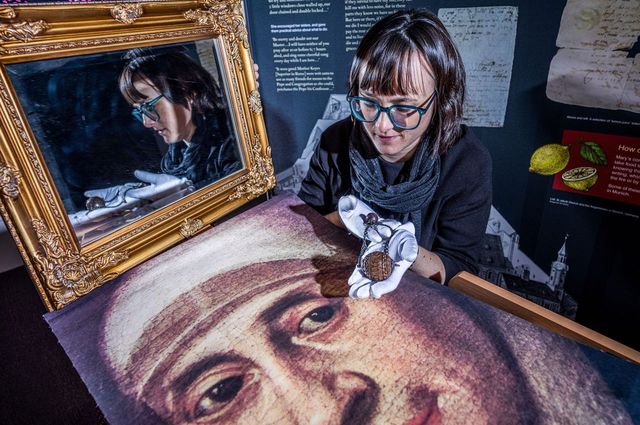
THE online campaign to support the cause to have 17th century York-born nun and educational pioneer Mary Ward declared a saint by the Roman Catholic Church will be launched today.
This petition launch heralds the beginning of the global annual celebration of Mary Ward Week 2024, marking her birth on January 23 1585 and death on January 30 1645.
In a nutshell, at a time when Roman Catholicism was illegal in England, Mary Ward strived for the equality and dignity of women in religion and education and paved the way for the first schools for girls to offer an education equal to boys, the second being established at the Bar Convent, Blossom Street, York, in 1686.
Today her vision is thriving in 42 countries at around 200 schools worldwide, and yet she was declared a heretic by the Catholic Church and was subjected to a 1631 Bull of Suppression that destroyed her first institution.
The subject of Ciaran O’Connor’s documentary, Mary Ward: Dangerous Visionary, voiced by Dane Judi Dench, Mary was the foundress of the Congregation of Jesus who reside at the Bar Convent, the oldest surviving Catholic convent in Great Britain.
On show there in the permanent display about Mary and her legacy is the 17th century crucifix that she carried on her multiple walks across the Alps to speak to the Pope, along with a pair of shoes from those walks and much else besides.
Prominent in the step-by-step progression to Mary’s “long overdue” beatification and canonisation by the Church is Sister Elizabeth Cotter, Canon Lawyer and Postulator for the Cause of Venerable Mary Ward, who will be promoting the campaign in York this week, with its centrepiece of an online petition to “take the cause to the next level”.
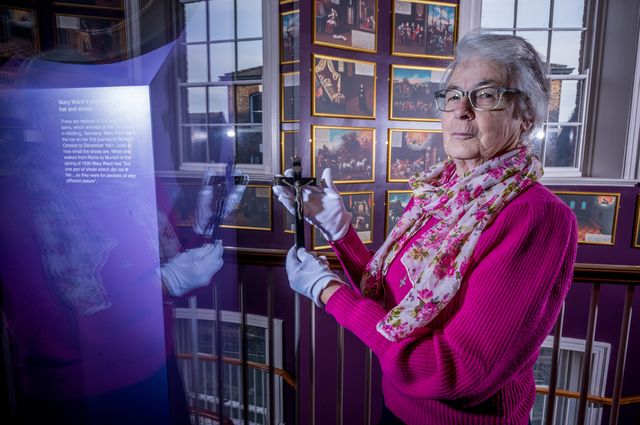
“As part of our case, we need to provide evidence that Mary Ward remains relevant today,” she says. “Key to this was her passionate belief that ‘women in time to come will do much’, which has always been the driving force of followers who brought her vision to 42 countries from her time and up to the present day.
“This recognition by the Church would provide the women of our time with a fine example of the Church’s willingness to promote the dignity of women in a world which badly needs such witness.”
Sister Elizabeth continues: “For the hundreds of thousands of Mary Ward followers worldwide, recognition by the Church would validate the belief that Mary Ward is a saint for the modern world; she is needed as much by our 21st century world as she was in those dark days of opposition to women in the 17th century.
“Support for and belief in Mary Ward has never waned in more than 400 years and her beatification and canonisation by the Church is long overdue.”
Sister Ann Stafford, sister in charge at the Bar Convent Living Heritage Centre, says: “We have been contributing to the ongoing global campaign to have Mary Ward officially recognised by the Church as a saint. As someone who campaigned for the dignity of women all of her life, we truly believe that Mary Ward is a vital role model for our time.
“Please help our cause in any way you can. You can sign the petition; join the conversation across the social media platforms using #MaryWardForSaint; visit us at the Bar Convent to discover more about Mary Ward; help us to raise awareness about this local woman who made international history, or let the Cause Office know if you can help us in other ways by emailing causemaryward@gmail.com.”
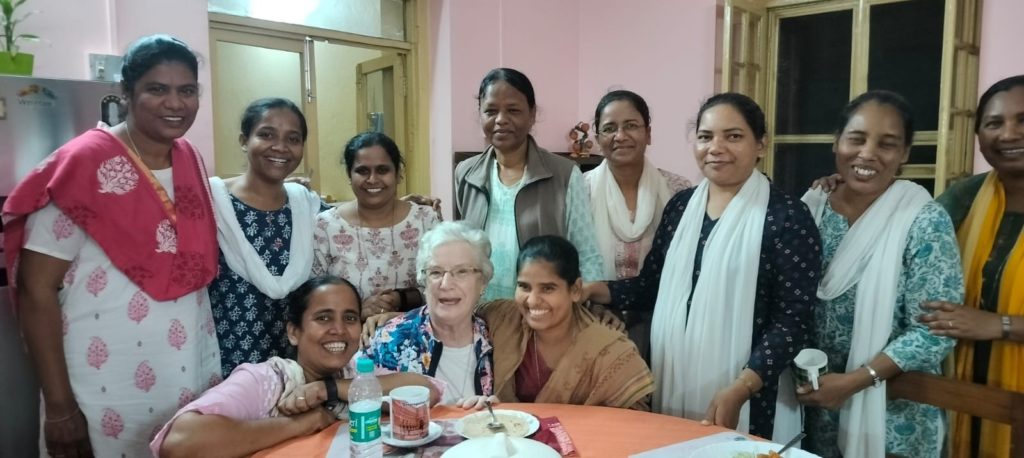
Explaining the present state of play, involving theological and historical commissions, Sister Elizabeth says: “The process is in the phase where the Church has to be sure that a person never worked or wrote against the Church or did anything contrary to the faith.
“But why has it taken so long? Mary was interred in a monastery in Anger, Munich, in 1631 when she was declared a heretic. When she was let out, she went to the Pope in Rome to seek her exoneration, but it has taken four centuries to do undo the damage done in what was written about her.
“The year of Veneration came in 2009 under Pope Benedict XVI, who had attended a Mary Ward kindergarten school in Germany as a five-year old.”
Now comes the Beatification stage. “We have to find proof of a miracle,” says Sister Elizabeth. “I was appointed to my role in 2015, and I spent 2015 to 2019 asking if anyone had come across a miracle resulting from a prayer to Mary Ward. We came across plenty.”
One such miracle has been selected, whereupon a tribunal/board enquiry has been set up in the Catholic diocese where it occurred, requiring proof of the person’s medical cure.
“Only when they have brought the enquiry to a conclusion will the authorities in Rome decide if Mary is to be beatified or not.”
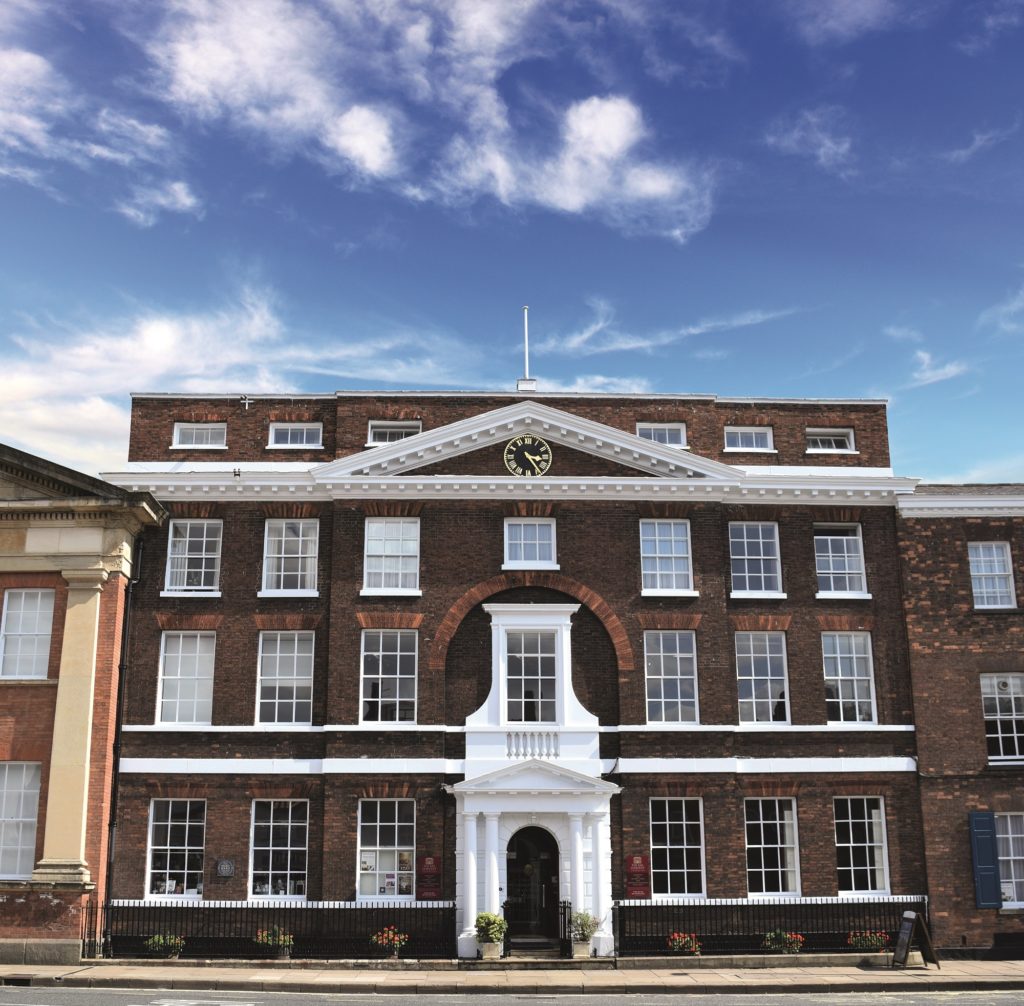
The case for Mary Ward was submitted in December 2019, but a combination of the Covid 19 pandemic and the workload of the tribunal priest has kept Sister Elizabeth and Mary’s followers waiting and waiting.
“But what keeps me going is remembering how long it took for Mary to be venerated. I just handle the process on Mary’s behalf and make sure it’s all in order, and we pray for this priest all the time, hoping he will be able to conclude the tribunal because he has so much on his plate.”
In the meantime, special events will be running throughout Mary Ward Week and until February 17 at Bar Convent to highlight the cause. These will be led off by today’s 12.30pm to 1pm talk by special collections manager Dr Hannah Thomas on Mary Ward’s history-making, ground-breaking vision for religious and educational change, against all the odds, and why she should be declared a saint.
At Sunday’s annual ecumenical service at 4pm at St Thomas’s, Osbaldwick, the Anglican church where Mary Ward is buried, the Most Reverend and Right Honourable Archbishop of York Stephen Cottrell will give the homily.
“When Mary Ward died, Catholics were not allowed to be buried in York, but Mary’s followers were so honest in their ‘bribing’ of the Anglican priest at this tiny church in Osbaldwick that he agreed for her to be buried there,” says Sister Elizabeth.
Mary’s tombstone is now placed inside the church, bearing an epitaph with a coded reference to her determination that women might take inspiration from St Ignatius: “To love the poore, persever in the same, live, dy and rise with them was all the ayme of Mary Ward”.
Now the aim is to make Mary Ward a saint.
For more details and the link to the online petition, head to: www.barconvent.co.uk. Bar Convent opening hours: Monday to Saturday, 10am to 4pm.
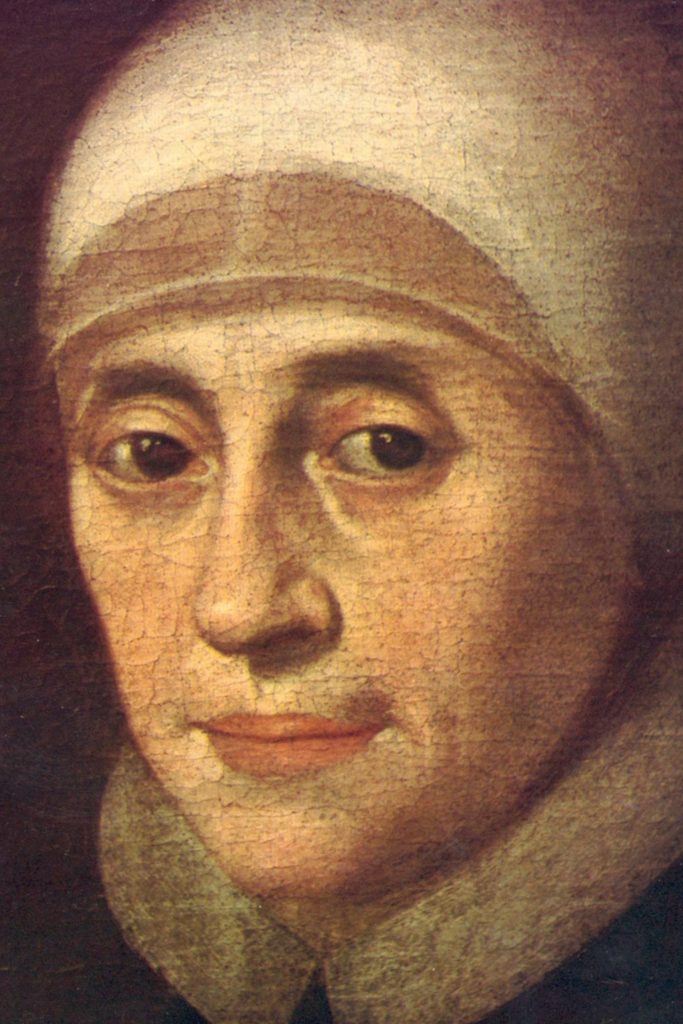
Mary Ward: the back story
MARY Ward was born into a devout Catholic family after the English Reformation had taken place.
She had a tumultuous childhood; her family was forced to relocate several times to avoid detection and was linked with the Gunpowder Plot.
She witnessed the brutal persecution of her fellow Catholics, including the imprisonment of members of her own family, such as her grandmother, Ursula Wright and the martyrdom of her cousin, Fr. Francis Ingleby, on Knavesmire, York.
Mary felt called to the Catholic religious life that had been banned in England for 70 years and travelled to the continent where many other Catholics had fled.
She and her companions founded the first religious congregation for women modelled directly on the newly founded Society of Jesus (Jesuits), who take a fourth vow of universal mission to go wherever the Pope might send them.
Mary Ward believed that women were spiritually and intellectually equal to men and deserved an education that reflected that equality. Providing a proper education for girls was central to her work, and she travelled widely across Europe, founding schools in ten European cities by 1628.
These views and methods were far ahead of her time and the Catholic Church opposed her at every step and even had her imprisoned.
In 1617 she famously said: “There is no such difference between men and women that women may not do great things – and I hope in God it will be seen that women in time to come will do much.”
To put this into context, this was at a time when philosophers were debating if women even had souls; and her own religious adviser questioned whether women had as much religious fervour as their male counterparts due to the weakness of their sex.
It was a firmly held belief that too much education would be too taxing for the female brain. Even centuries later, in 1895, a manual on child development argued that if a girl overused her brain, it would damage her ability to bear children, noting that ‘this New Woman is only possible in a novel and not in nature’.
Mary Ward died on January 30 1645 during the English Civil War, having never seen her vision fully realised. She is buried in the churchyard at St Thomas’s, Osbaldwick, York, where her tombstone can be seen inside the church.
Across the global network of her religious congregation, the Bar Convent is the focal point and home of the historic legacy of her work.
After her death in 1645, her followers continued her work and opened a secret convent in York. They were the first to open schools for girls in this country that offered the same education as boys.
There is now a global following of thousands of religious sisters, along with around 200 schools worldwide in Mary Ward’s name, lay collaborators and Friends of Mary Ward.
Pope John Paul II singled out Mary Ward as an “extraordinary Yorkshire woman and a pioneer” in 1982 when he celebrated a Mass in York attended by 210,000 people.
In 2009, she was declared Venerable by Pope Benedict XVI, in the first step on the road to canonisation and sainthood. The next step is to have Mary Ward beatified, an ongoing task.
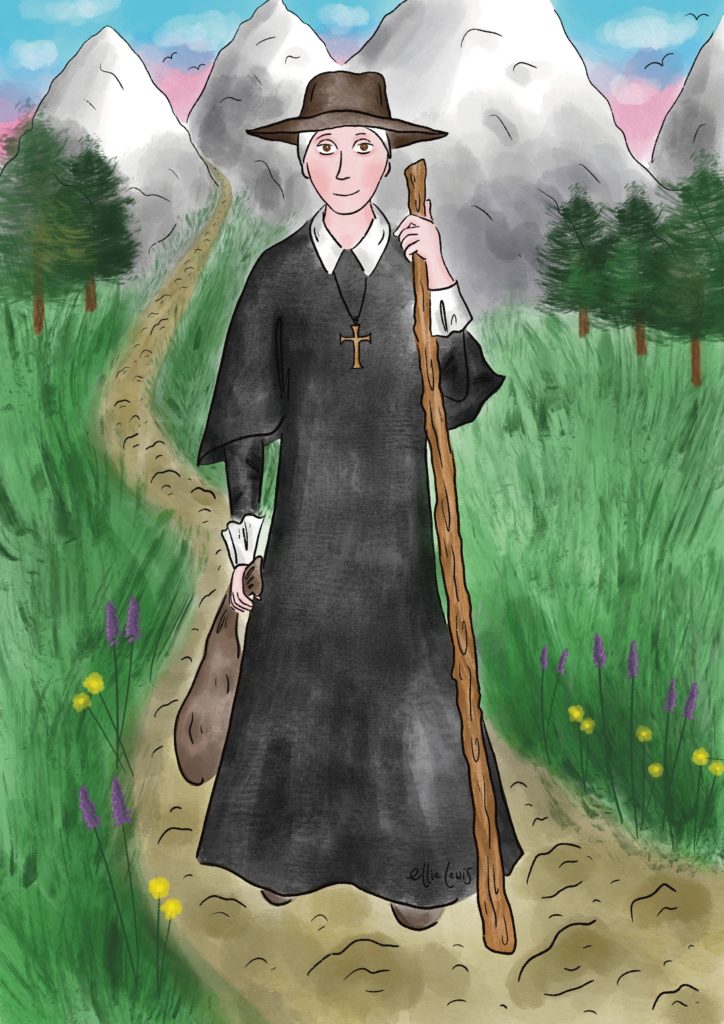
Why does Mary Ward deserve to be a saint? The Bar Convent charts the reasons
1. Mary Ward pioneered a new way to live the consecrated life at a time when the monastic life was the only way acceptable to the Catholic Church. Believing that God’s will was driving her towards this new way, she persevered despite imprisonment and condemnation by the Church she sought to serve.
Exonerated eventually, Mary Ward’s holiness of life was recognised by the Church in 2009 when Pope Benedict declared her “Venerable.” At a time when the worldwide Synod called by Pope Francis is urging stronger roles for women within the Church, Mary Ward is a prime role model for future generations and especially for girls.
2. Mary Ward’s passionate belief that “women in time to come will do much” has been the driving force of those who brought her vision and values to 42 countries in every continent from her time and up to the present day.
She continues to provide inspiration to the women of our time. Recognition by the Church would provide a much-needed example of the Church’s willingness to promote the dignity of women in a world which badly needs such witness.
3. Her key values of freedom, justice, sincerity and joy, vital in her 17th context, retain their significance and importance in a world so devoid of these virtues today.
4. Despite the way she was treated by the Church of her time, Mary Ward retained her love for it, urging her followers to “love the Church”. She is a model of critical fidelity at a time when many struggle within the Church.
5.Mary Ward lived and worked for the greater glory of God despite the obstacles in her way. Her life challenges us to do the same.
6. Mary Ward was an Englishwoman who held fast to the Catholic faith in an era of persecution and hostility to the Church. What a role model she is to English Catholics today. By making her a saint, the Church would give recognition to the many faithful women and men who hold fast to the faith despite difficulties.
7. For the hundreds of thousands of Mary Ward followers worldwide, recognition by the Catholic Church would validate the widely held belief that Mary Ward is needed as much by our 21st century world as she was in the dark days of opposition to women in the 17th century.
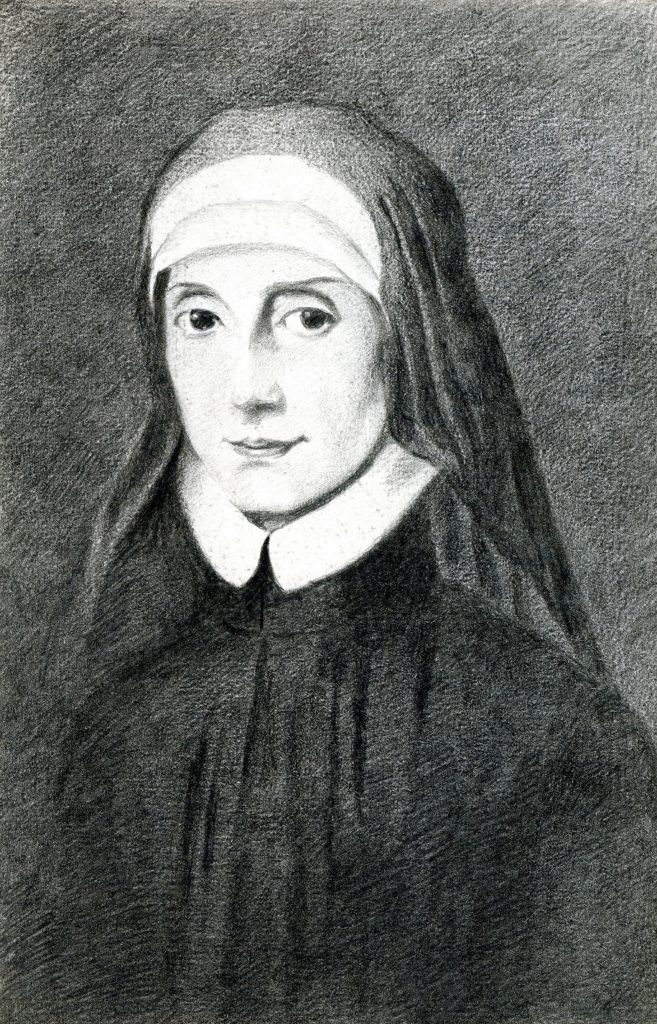
Prayer for Mary Ward’s Beatification
God, Creator of all that is good,
we thank you for giving Mary Ward
to the Church and to the world.
Impelled by the fire of your love
she did not shrink from risks,
labours or sufferings.
She lived and worked for your greater glory
for the good of the Church,
for the nurture of faith,
and for the dignity of women.
She was a pilgrim,
who spread the joy of the Gospel,
a woman of our times.
Grant that through the solemn
testimony of the Church the example
of her life may be a light for all
who seek God’s will.
Amen
